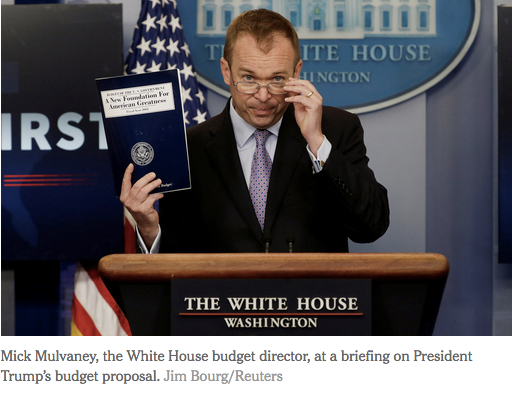President Trump entered office facing the worst ratio of debt to gross domestic product of any new president in American history except Harry Truman — an onerous 77 percent. So, like many presidents before him — including, most recently, President Barack Obama, who had to respond to the economic crisis he inherited — President Trump is faced with the choice of whether and how to confront a looming situation not of his own making.
To his credit, the president put forth the goal of balancing the budget over a decade and starting to reduce the debt. Still, goals don’t balance budgets, tough choices do. President Trump’s budget sticks to his campaign promises — including increasing military spending, investing in infrastructure, talk of tax cuts without specific offsets and “protecting” Social Security and Medicare, a reassuring political promise that removes over one-third of the budget from consideration.
The problem is, those promises didn’t add up on the campaign trail, and they don’t now.
. . .
Yes, Republicans have a blind spot when it comes to acknowledging that revenues must be a part of the fix. But to their credit, many Republicans — including, notably, Paul Ryan, the speaker of the House — have made the case for why we have to reform our largest entitlement programs, including Social Security and Medicare (though there has recently been a disquieting silence on the topic). And many Republicans are taking the responsible position that tax reform should at least be revenue neutral.
Democrats, many of whom too often act as demagogues on entitlement reform, are clear that taxes must increase (though they also must stop pretending it is just millionaires who will be affected). They also have been admirable in their commitment to the pay-as-you-go principle in recent major legislation, which at least keeps us from digging the hole deeper.
On Budget, No Clarity, and So Far No ‘Magic Unicorn’
The unveiling of President Trump’s first budget and the initial congressional hearings on overhauling the tax code should have brought clarity to the administration’s top legislative priorities.
That didn’t happen.
Instead, testimony from Mr. Trump’s top economic advisers cast even darker shadows over a murky legislative process that has fallen well behind schedule. Their explanations of the budget and their tax plans in public seemed to generate more questions with almost every answer.
Here’s where things stand.




